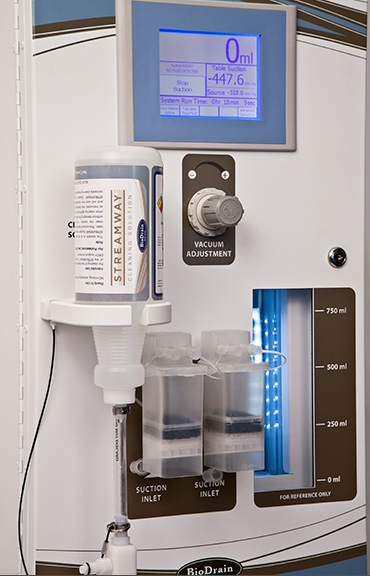FDA's warning letter to Stryker has created a unique opportunity for BioDrain Medical and its relatively unknown surgical fluid waste management product.

It's not everyday that a company with next-to-zero name recognition and a history of corporate mismanagement gets handed a golden opportunity.
But that is indeed the situation that BioDrain Medical, which makes a fully automated, environmentally friendly surgical fluid waste management system, finds itself in.
After its Streamway System won FDA clearance back in 2009, BioDrain's management could never really get the product off the ground. Last year, an investor who later became a board member took over reins of the company intending to provide the infrastructure and discipline needed to roll out the product.
|
BioDrain Medical's Streamway System |
And then something fortuitous happened. FDA issued safety communications about Stryker's Neptune Waste Management System and earlier this week a warning letter. Last year, Stryker issued a Class I recall for models of one particular Neptune product line as well as stopped selling some Neptune products for not having the requisite 510(k) clearance to market them.
On Thursday, FDA updated its safety communications from October, telling providers that it recommends "alternative legally marketed devices be used in their place."
No nine words could sound sweeter to the ears of BioDrain Medical CEO Josh Kornberg who became CEO in April after becoming a board member in March 2012.
Kornberg believes strongly that the Streamway system is head and shoulders above any of the manual, hand-held plastic or glass canisters that hospitals use to collect and dispose of bodily fluids and waste collected during surgical procedures or even technological upgrades of that system like Stryker's Neptune.
"If Stryker had no issues, we would be still taking market share from them," Kornberg declares. "But the warning letter is a fortunate issue for us."
What is the root of all this confidence?
Kornberg explains that current fluid waste management systems are unsafe because they expose operating room staff to bodily fluids and there is a real question of occupational safety that hospitals are concerned with. They also take up space beside the operating table. Mobile versions of the manual system - like Stryker's Neptune which incorporates mobile roving device that can be moved to a waste disposal area to empty the contents collected in the canister - have limited capacity because they can only collect fluids until the canisters fill up and then a new one has to be put in place.
BioDrain's Streamway on the other hand is mounted on a wall in the operating room is hooked up to the hospital or surgical center's plumbing, electrical and vacuum systems. A universal tubing hooks up the device to the patient that can suck out the fluids and transfer it to the mounted wall unit which continuously disposes off the waste fluid through the plumbing. A digital monitor tells operating room staff how much fluid has been collected.
"It is automatic technology that is installed on the wall, requires no handling and has a basically digital touch screen that the nursing staff can use to modify the settings on our machine and that also a digital reading of the volume intake and the vacuum suction level," Kornberg says.
The mounted unit comes with two disposable components - a bottle with cleaning solution and a filters - that need to be thrown out after every procedure.
Kornberg believes the Streamway is cheaper too. That's because among other things, hospitals don't have to buy solidifiers to solidify the fluids before they can be disposed. Because is is continuously draining out fluids through the plumbing, there is no interruption to the surgical procedure which is necessary for canister-based waste management systems.
Whereas the Neptune System can cost as much as $50,000 - for the mobile unit and the docking station - the Streanway lists at $18,000, he says. [However, one version of the Neptune system is also able to remove surgical smoke in addition to removing fluid waste.]
For all these reasons, in addition to Stryker's misfortune Kornberg feels confident that he will be able to change hearts and minds of hospitals and surgical centers. Already in addition to approaching hospitals and surgical centers individually, he has worked with group purchasing organizations, one of which has approved the Streamway. He is also working with large hospital chains like HCA and Vanguard. The company has sold 20 units in places like New York, New Jersey, Michigan, Minnesota and Pennsylvania and is trialing the device in many other locations.
Kornberg is also looking at international expansion in Europe, Asia and Canada and is working toward getting CE Mark.
For all his confidence, Kornberg is reluctant to provide revenue projections for BioDrain Medical, which trades over the counter.
"We've been really more focused on educating the market on the fact that we exist now and that we are by far a much better alternative than every other product or technology that is out there," he says.
-- By Arundhati Parmar, Senior Editor, MD+DI
Related Content
Infection Control: Market Opportunity for Devices
About the Author(s)
You May Also Like



